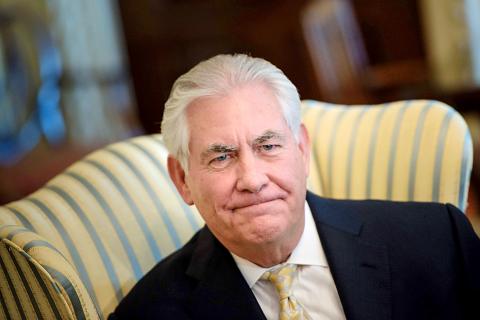New US Secretary of State Rex Tillerson recently reaffirmed the “six assurances” regarding US policy toward Taiwan in response to questions from US Senator Ben Cardin before the US Senate confirmed him as the country’s top diplomat on Feb. 1.
In the written responses, Tillerson said that the Three Joint Communiques, the Taiwan Relations Act (TRA) and the “six assurances” provide the foundation for US policy toward Taiwan and China, adding that the US should continue to uphold its “one China” policy and support a peaceful and mutually agreeable cross-Taiwan Strait outcome.
Tillerson was replying to Cardin’s questions regarding whether the principles of the communiques and the TRA remain the important foundations of the US-China relationship and whether he believes that the “one China” policy remains valid or needs revision.

Photo: AFP
He also said that if confirmed, he intends to support the “one China” policy.
Tillerson was also asked whether he was concerned that US President Donald Trump’s suggestion in an interview in December last year that the “one China” policy was negotiable might have created the impression that Taiwan is nothing more than a bargaining chip and might undermine the US’ ability to support Taiwan and protect US interests in peace and stability in the region.
“The people of Taiwan are friends of the United States and should not be treated as a bargaining chip. The US commitment to Taiwan is both a legal commitment and a moral imperative,” he said.
Under the “one China” policy, the US recognizes the People’s Republic of China as the sole legal government of China and acknowledges the Chinese position that Taiwan is part of China, Tillerson said.
As required by the TRA, the US continues to provide Taiwan with defensive arms and maintains the capacity to resist any resort to force or other forms of coercion that would jeopardize the security, or the social or economic system, of the people of Taiwan, Tillerson wrote.
He said that the US also upholds the “six assurances” toward Taiwan, adding that, if confirmed, he would continue these policies and work to ensure that the cross-strait military balance remains favorable to peace and stability.
Tillerson first mentioned the “six assurances” at his confirmation hearing before the Senate Committee on Foreign Relations on Jan. 11.
Then-US president Ronald Reagan issued the “six assurances” in 1982, which include pledges not to set a date for ending arms sales to Taiwan, not to hold prior consultations with China regarding arms sales to Taiwan and not to play a mediation role between Taiwan and China.
They also promise that the US will not revise the TRA, will not pressure Taiwan to enter into negotiations with China and will not formally recognize Chinese sovereignty over Taiwan.

The Taiwanese passport ranked 33rd in a global listing of passports by convenience this month, rising three places from last month’s ranking, but matching its position in January last year. The Henley Passport Index, an international ranking of passports by the number of designations its holder can travel to without a visa, showed that the Taiwan passport enables holders to travel to 139 countries and territories without a visa. Singapore’s passport was ranked the most powerful with visa-free access to 192 destinations out of 227, according to the index published on Tuesday by UK-based migration investment consultancy firm Henley and Partners. Japan’s and

NATIONAL SECURITY THREAT: An official said that Guan Guan’s comments had gone beyond the threshold of free speech, as she advocated for the destruction of the ROC China-born media influencer Guan Guan’s (關關) residency permit has been revoked for repeatedly posting pro-China content that threatens national security, the National Immigration Agency said yesterday. Guan Guan has said many controversial things in her videos posted to Douyin (抖音), including “the red flag will soon be painted all over Taiwan” and “Taiwan is an inseparable part of China,” while expressing hope for expedited “reunification.” The agency received multiple reports alleging that Guan Guan had advocated for armed reunification last year. After investigating, the agency last month issued a notice requiring her to appear and account for her actions. Guan Guan appeared as required,

Japan and the Philippines yesterday signed a defense pact that would allow the tax-free provision of ammunition, fuel, food and other necessities when their forces stage joint training to boost deterrence against China’s growing aggression in the region and to bolster their preparation for natural disasters. Japan has faced increasing political, trade and security tensions with China, which was angered by Japanese Prime Minister Sanae Takaichi’s remark that a Chinese attack on Taiwan would be a survival-threatening situation for Japan, triggering a military response. Japan and the Philippines have also had separate territorial conflicts with Beijing in the East and South China

A strong cold air mass is expected to arrive tonight, bringing a change in weather and a drop in temperature, the Central Weather Administration (CWA) said. The coldest time would be early on Thursday morning, with temperatures in some areas dipping as low as 8°C, it said. Daytime highs yesterday were 22°C to 24°C in northern and eastern Taiwan, and about 25°C to 28°C in the central and southern regions, it said. However, nighttime lows would dip to about 15°C to 16°C in central and northern Taiwan as well as the northeast, and 17°C to 19°C elsewhere, it said. Tropical Storm Nokaen, currently